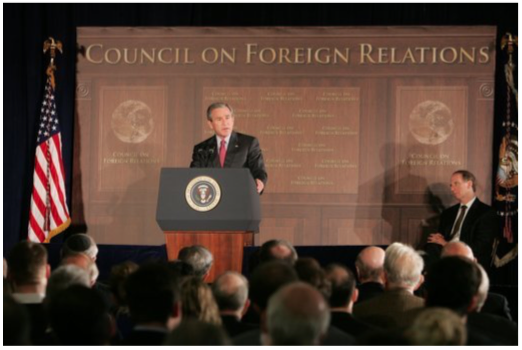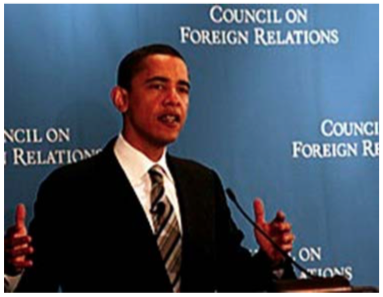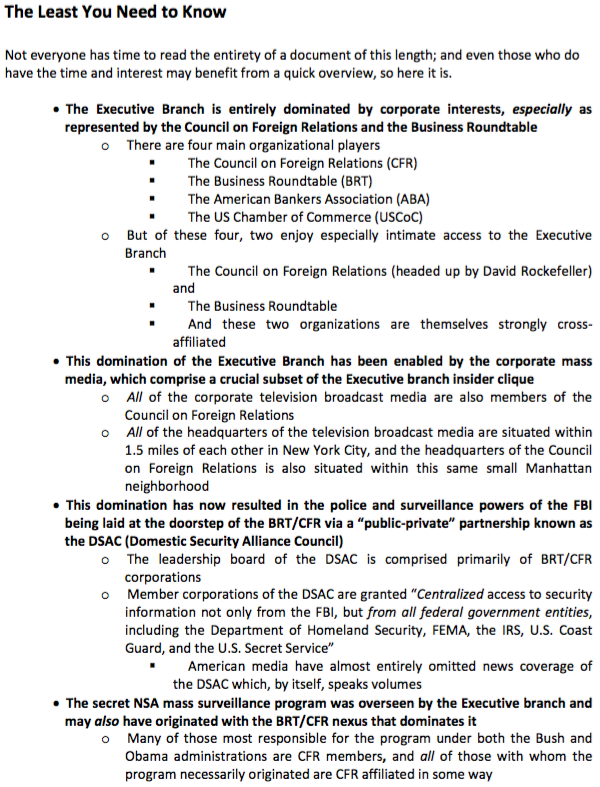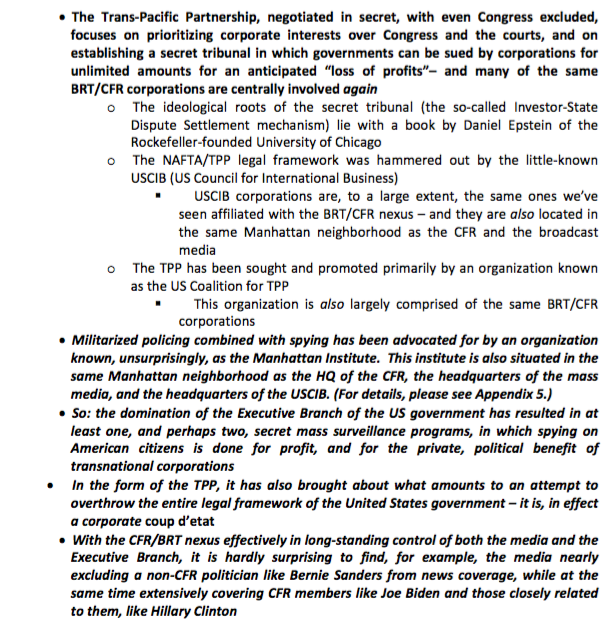Deep Politics:
Institutionalized Corruption at the Top
and the Corporate Assault on Democracy
K. L. Roberts
“. . .all the physical and conceptual walls associated with the modern, sovereign state—the walls that divide domestic from international, the police from the military, intelligence from law enforcement, war from peace, and crime from war—are coming down.”
The Manhattan Institute
“Fascism should more appropriately be called corporatism because it is a merger of state and corporate power.”
Attributed (incorrectly) to Benito Mussolini’s Encyclopedia Italiana article, but nevertheless true
2
1. An Introduction to “Deep Politics”
“The finest trick of the devil is to persuade you that he does not exist.”
Charles Baudelaire
DC insider Mike Lofgren has said that “There’s a shadow government running the country, and it’s not up for re-election.”
Defense expert William Arkin says that a “terrified government is destroying the constitution.”
But neither of these individuals ever gets around to naming any names. From a reading of their accounts, one could only conclude that no actual, specific human beings are responsible, only vague institutions like Wall Street , the Military Industrial Complex, and a “terrified government”.
Obviously, however, institutions are made up – entirely – of human beings. And the good news is that sociologists know, to some degree, who they are.
3
In this white paper we’re going to introduce some key players to you, and we’re also going to tell you what they’ve been up to the last few years. (Unfortunately, it could hardly be more alarming.)
One faction of the “shadow government” is comprised of “defense” contractors and revolving- door, ex-government “neo-cons” a la Dick Cheney. Another faction is made up of executives of transnational financial institutions, corporations and banks. All are politically active; but, as we’ll see, there exists an inner core which has long focused on the executive branch. More peripheral organizations, though related, and certainly significant, have other priorities.
The primary aim of this document is to provide a quick and very rough introduction to this inner core, which is largely (though, of course, not exclusively) responsible for many of the problems that concern most Americans. To do this we’ll focus on the most tightly-integrated core players only. Much of what you’ll discover will shock you, so we’ve made this paper self-documenting. But to keep it readable, we’ve moved most of that documentation into appendices, with the exception of fairly extensive hyperlinking.
If you do want to learn more about individuals and organizations beyond the inner core – and you really should – a terrific introduction is available from sociologist Peter Phillips of Project Censored. Here’s that link. And a good overview of the transnational financial framework is available from David Korten here. You can find other relevant names named at another white paper written by Phillips here.
The core faction in question is comprised of the CEOs of a relatively small group of cross-affiliated corporations, including, crucially, media corporations. We’ll refer to this Executive branch insider clique as the Business Roundtable/Council on Foreign Relations Nexus. (Because that’s a bit of a mouthful, from this point forward we’ll also just call it “the Nexus” or the “BRT/CFR Nexus”.)
4
We’ll see that these corporations have long cultivated an intimate relationship with the Executive branch (that is, the Presidency ) of the United States, as well as with the NSA and (previously unknown) FBI mass-surveillance programs. And we’ll also see that they are a key force behind the “trade accord” known as the Trans-Pacific Partnership (TPP), which Chris Hedges calls “the most brazen corporate power grab in American history.”
Because it would be easy to lose sight of the forest for the trees even in this sort of simplified account, it should be stated clearly that the “brazen corporate power grab” Hedges is talking about is, incredibly, like something straight out of a Bond movie: the CEOs and bankers involved are seeking nothing less than total global political, economic, and military control by the owners of transnational corporations and banks.
If it passes, the TPP will hand over to them a big chunk of what they want on a silver platter.
On now to the anatomy and physiology of the more domestic side of the nexus, the engineers of this mad power grab.
Hold on to your hat. You are about to experience one wild ride into terra incognita.
“Some of the problems of governance in the United States today stem from an excess of democracy . . . . Democracy is only one way of constituting authority, and it is not necessarily a universally applicable one.”
The Corporate Media and the Council on Foreign Relations
One might think that anything on the scale of a global corporate takeover would, absolutely, be front-page news. But if most of the news itself originates from within enormous media conglomerates then that assumption would, obviously, be thrown seriously into doubt. (87% of Americans get some news from television, and 24% prefer it to all other sources.) And, of course, even the most informative news doesn’t come labelled as manifestations of a corporate takeover. It comes labelled instead as stories about, say, Citizen’s United v. Federal Election Commission, or headlined as controversy over the Glass-Steagall Act, or, though very rarely, the TPP. Nevertheless, all such stories do mark the same trend.
So let’s begin our introduction to the “shadow government” by having a closer look at its key, and indeed essential, ally: the corporate broadcast media. (The print media are almost as bad, as you’ll see in Appendix 2.)
Continue reading HERE.
___
http://cryptome.org/2016/08/deep-politics-rev4.pdf
—
http://themillenniumreport.com/wp-content/uploads/2016/12/Deep-Politics.pdf






